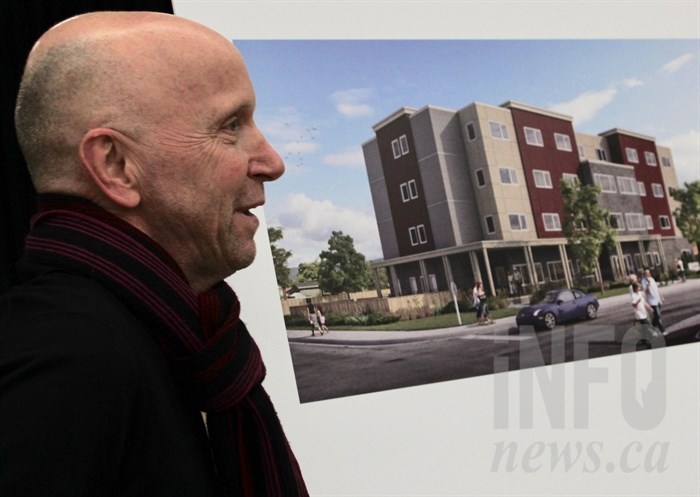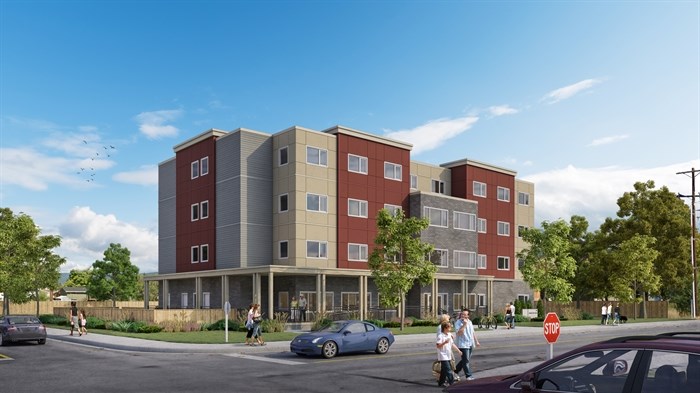
B.C. Housing's Dominic Flanagan defends a proposed 50-unit supportive housing project on McIntosh Road in Kelowna's Rutland neighbourhood at an open house, Tuesday, Jan. 29, 2019.
(ROB MUNRO / iNFOnews.ca)
January 30, 2019 - 11:45 AM
KELOWNA - Another supportive housing project in Kelowna is meeting with strong neighbourhood opposition.
B.C. Housing held an open house for the proposed 50-unit housing project on McIntosh Road in Rutland last night, Jan. 29, at Centennial Hall to provide information to residents and businesses within a 300 metre radius of the site. People started lining up at 5 p.m. and within the first 10 minutes about 65 people had already filed through the doors. Letters were sent to 700 addresses near the McIntosh Road site, letting them know about the open house that ran from 5:30 p.m. to 7 p.m.
It would appear B.C. Housing refuses to take the advice of Kelowna city councillor Brad Sieben and improve its communication strategy. Following a Jan. 17 marathon hearing to rezone the Agassiz supportive housing project just behind Orchard Plaza mall, Sieben chastised both B.C. Housing and the John Howard Society for not doing a good enough job explaining what these projects are all about.
At last night's open house on the McIntosh Road project, B.C. Housing displayed about a dozen sign boards on supportive housing but nowhere did it clearly state that it was a “harm reduction facility.” That’s the term used by B.C. Housing to indicate that residents are allowed to consume drugs and alcohol in their own homes – what opponents like to call a “wet” facility.
“If you try to hide a small thing, people will be less likely to trust what you do,” nearby resident Mike (who refused to give his last name) told iNFOnews.ca.

Proposed supportive housing project for McIntosh Road in Rutland is pictured in this submitted image.
Image Credit: SUBMITTED/B.C. Housing
While staff attending the session were quite willing to explain the acceptance of drug use on site, they had to be asked.
Even Dominic Flanigan, the executive director for Strategic Initiatives for B.C. Housing throughout the province, refused to explain why his agency is not taking that criticism seriously and changing its presentation.
“There’s a perception that, when we talk about homelessness, we equate homelessness with addictions and criminality,” Flanigan said when asked why B.C. Housing isn’t up front about the drug and alcohol consumption on site. “It’s really important that, when we talk about homelessness, we’re not talking a homogenous population. There’s a range of reasons why people fall into homelessness.”
Despite repeated attempts to get him to address the communications strategy, he kept veering to staid lines about the importance of housing first, giving supports to people who want to make changes in their lives, etc.
Those kinds of responses did not sit well with people like John Buck, whose house is next door to the proposed site.
“How are they venting people?” he asked. “What kinds of guidelines do (residents) have to follow? A lot of people say they will do better but what if they don’t show progress? What if they fall back on old habits? Do they get moved out?”
Buck said he was told, when he asked staff those questions, that residents are screened by various agencies. But he could not find out if they were required to enroll in programs or could be evicted if they didn’t follow rules.
Mike suggested B.C. Housing provide a profile of what kind of person would be accepted as a resident and what kind would be rejected but, again, felt he could not get any straight answers from staff. He also raised concerns about illegal drug use in the site.
“If I was to stand in my front yard and smoke a crack pipe, I would go to jail,” he said. “If (staff) walk by somebody with a crack pipe what do they do? It’s illegal.”
He said when he asked staff that question all he got for an answer was "we meet them where they’re at."
The biggest opposition to supportive housing seems to be around the fact drugs and alcohol can be used on site and neighbours don’t like the fact they’re not told straight out that will be the case. But there is also concern about having “these types of people” living in their neighbourhood.
While the opponents to the Agassiz supportive housing project spoke loudly about elderly women living in fear, the Rutland residents were concerned because of the number of young children living in their neighbourhood.
The Agassiz property went through a rezoning hearing in front of Kelowna City Council on Jan. 17. It was approved unanimously despite strong opposition. It still has to go to council for a development permit on the form and character of the building.
The McIntosh property already has the proper zoning so there is no opportunity for residents to speak to city council in a public hearing format. It will need a development permit from the city but there’s no formal opportunity for public input in that process.
To contact a reporter for this story, email Rob Munro or call 250-808-0143 or email the editor. You can also submit photos, videos or news tips to the newsroom and be entered to win a monthly prize draw.
We welcome your comments and opinions on our stories but play nice. We won't censor or delete comments unless they contain off-topic statements or links, unnecessary vulgarity, false facts, spam or obviously fake profiles. If you have any concerns about what you see in comments, email the editor in the link above.
News from © iNFOnews, 2019